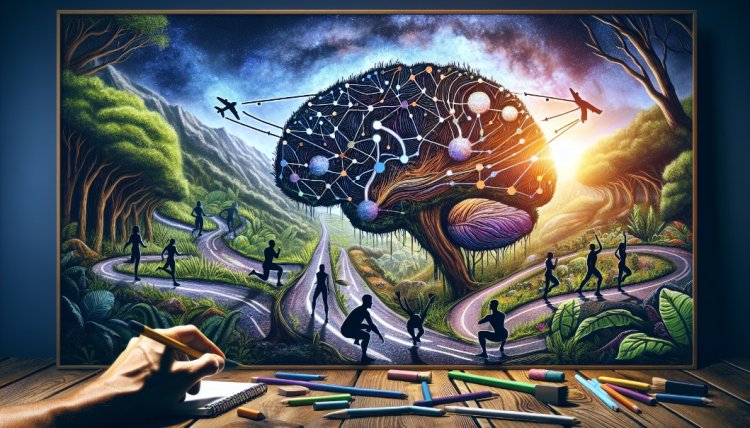Understanding the Science of Habits and How to Make Positive Changes
Unlock the secrets of habit formation! Dive into the science behind your routines, learn how habits shape your life, and discover powerful strategies to break bad habits and build positive ones. Transform your autopilot, one step at a time!

Introduction
Have you ever felt like there's a difference between who you are and who you want to be? We all have little things we think we should do and big things we want to achieve. Sometimes, we think we have to change who we are to reach our goals. This could mean doing things like exercising a lot, eating good food, learning a new language, writing a book, reading more, or spending less time on social media. Perhaps, despite your best efforts, you have only marginally succeeded in imitating that individual. Sometimes, even though we try really hard, we go back to doing things we know we shouldn't. It feels like we always mess up in the end. And when you continue to attempt something without success, you become extremely irate and begin to believe that it is entirely your fault.
But, you see, making changes can be difficult. And even though those stories on the internet might make it seem like it's all your fault if you don't succeed, that's not completely true. Knowing how habits work can help you make changes that stick around for a long time. Your brain is like a really thick and green jungle. It has lots of paths and connections. When you start doing something new, you make rough and messy paths through the bushes and plants. The more you keep doing this thing, the more noticeable the trail gets. As time goes on, it changes into a simpler road, and eventually, it turns into a big highway. It's really easy, like something you do all the time, to cross that big road.
It's really hard to change your habits, especially when you're a grownup and your brain is used to doing things a certain way. But knowing the difference between routines and habits can be helpful. Routines are like a set of steps that you do in the same order every time because they have been successful for you before. Habits are things you do without even thinking about them. They're like actions that you do automatically. Cues are like signals that tell your brain to start doing something. They can be simple things, like a little reminder, or whole situations that make you want to take action.
If you want to make change easier, you need to make new routines and turn them into habits. First, take your big ideas and make them smaller and easier to understand. Make these actions really easy to do, like so easy that you can do them without trying too hard. If you want to exercise, you can start with something easy, like doing ten squats every morning. Make sure you have clear rules that tell you when to start your new routines. It could be a certain time of day, something you see that reminds you, or both. Do these things often, like every day, if you can. As time goes on, they will change from doing things regularly to doing them automatically.
Making new habits might not feel as good right away as doing things that aren't good for us, but it's better for us in the future. Hey there! So, you know how, when things are different, we call it a change? Well, change is actually more like a path or a way to go than a specific place you end up at. It's like when you're walking somewhere, the change is the direction you're going in, not the exact spot you'll end up at. It's always better to make little improvements in your life instead of staying stuck and not changing anything at all. And if you know more about how habits work, you can give yourself the power to make changes that stick and become the person you want to be.
The Jungle of Your Brain
Think of your brain as a really thick and green forest with lots of paths and connections. Making decisions or taking action is like exploring a jungle in your brain. It takes work and energy, just like finding your way through a real jungle. Your brain doesn't like using too much energy, so it came up with a smart way to save it. It made special paths called neural pathways to help it use less energy.
Everything you do and how you act leaves a mark in your brain, like footprints in the jungle. When you start doing something new, you make rough and messy paths through the bushes and plants. The more times you take this action, the clearer the path gets. As time goes on, it changes into a simpler road, and later on, it turns into a big highway. It's super easy, like something you do all the time, and feels really safe.
It's hard to change your habits, especially when you're a grownup and your brain already has certain ways of doing things. Doing something over and over again for a long time makes your brain really used to it. It becomes really hard to make your brain think differently because it's so used to doing things a certain way. Your brain has special reactions that happen automatically when certain things around you happen. These reactions tell your brain it's time to do something or start an action.
Knowing the difference between routines and habits can help you when you want to make a change. Routines are like a set of steps that you do in the same order every time. You do them this way because it has always worked out well for you before. Habits are things you do without even thinking about them. They are like really strong habits in your brain that get turned on by certain things.
When you want to start doing something new all the time, you have to make new roads in your brain. To make change easier, first, make your goals less confusing by breaking them into clear and specific actions. Make these actions really easy to do—so easy that you can do them without much work. If you want to exercise, you can start with something easy, like doing ten squats every morning.
Make sure you have clear rules that tell you when to start your new routines. It could be a certain time of day, something you see, or both. Do these things often, like every day, if you can. If you keep doing these things over and over again, they will eventually become habits. It might take a while, and you have to work hard, but if you make new paths in your brain, you can make changes that stick around.
It is important to note that the process of altering one's habits does not occur instantaneously. It's more like a journey that takes time. You have to be patient, keep doing the same thing, and be open to changing your plans. Get excited about changing how your brain works, and be happy about every little progress you make. If you know more about how habits work, you can make changes that stick, and you can become the person you want to be.
Routines and habits
When we want to make good changes in our lives, it's important to know the difference between routines and habits. Routines are like a plan that someone makes. They do the same things in the same way every time because it has worked before. Our brain has two sides: one that plans and thinks carefully, and another that makes decisions without us even realizing it.
Habits are things we do without even thinking about them. They're like actions we take automatically. They are like really strong habits in our brains that get turned on by certain things. Habits are like a little kid in our brain that acts without thinking about what will happen later. It just does what it wants right away.
When we want to start doing something new, our brain needs to make new pathways. These pathways help us remember and do new things more easily. To make it easier to make changes, we can start by breaking down our goals into clear and specific things we need to do. These actions should be really easy and not take much work to do. For instance, if we want to get some exercise, we can begin with something easy, like doing ten squats every morning.
To make these new routines into habits, we have to set up clear reminders. This can mean a certain time during the day, something you can see, or both things together. If you keep doing these things over and over again, like every day, they will slowly become habits. It might take a while and some hard work, but if we make new paths in our brain, we can make changes that stick around.
It's like when you do something good and you get something good in return. Our brain likes to find things that make us happy, and when we do something that makes us happy, we want to do it again. That's why it's easy to start doing things that aren't good for us because they make us feel good right away. But if we make the things we do fun or give us something good, it's more likely that we'll keep doing them all the time.
Making new habits can be hard, but it's worth it. Hey there! So, you know how sometimes things can be different from how they used to be? Well, that's called change. But here's the thing: change isn't like a specific place you can go to. It's more like a way things can go. It's like going in a certain direction instead of going to a specific spot. It's always better to make little improvements in our lives instead of staying stuck and not changing anything at all. If we learn about how habits work and use tricks to make new routines, we can make big changes that stick and become the person we want to be.
So, if you want to make a good change, remember to know the difference between routines and habits. The planner uses smart actions to make new routines, and then the toddler helps turn them into habits. If you work together with these two things, you'll be on track to reach your goals and make big changes in your life that will stick around.
Creating Habits
When we want to make good changes in our lives, one of the best ways is to make habits. Habits are things we do without even thinking about them. They are like really strong habits in our brains that get turned on by certain things.
If you want to make change easier, you need to make your goals more clear and specific. This means breaking them down into smaller actions that are easy to understand and do. Make these actions really easy to do, like so easy that you can do them without trying too hard. For instance, if you want to get moving, you can start with something easy, like doing ten squats every morning.
Making sure you have clear signals for your new routines is really important. Triggers are things that can make you remember or do something. They can be a certain time of day, something you see, or both together. These triggers tell your brain to start doing something. For example, if you want to read more, you can make it easier by picking a certain time every day and putting a book on your nightstand as a reminder.
Doing something over and over again and always doing it the same way is super important if you want to make it a habit. Try to do these things often, like every day, if you can. The more you do something over and over again, the stronger the path in your brain becomes. This makes it easier for your brain to remember and do that thing again. As you keep doing these things, they will become habits, and you won't even have to think about doing them anymore.
It's important to remember that when we do something over and over again, we usually get something good in return. Our brain is like a computer that wants to find good things. When we do something that feels good, our brain wants to do it again. So, it's a good idea to make the new thing fun or give a prize for doing it. If you want to eat healthier, you can try making different recipes and using new flavors to make it more fun.
Making new habits might not always make you feel good right away, but it's important because it will help you in the future. Hey there! So, you know how sometimes things can be different from how they used to be? Well, that's called change. But here's the thing: change isn't like a specific place you can go to. It's more like a way things can go. It's like going in a certain direction instead of ending up at a specific spot. It's always better to make little changes in our lives instead of staying stuck and not changing anything at all. If we want to become the person we want to be, we can do some things to help ourselves. We can break our goals into smaller parts, find things that make us want to do those goals, do them over and over again, and make them fun.
Challenges and timeframe
Making new habits and changing things for the better can be hard. It's really important to understand that it can be hard to keep doing new things. When we do things over and over again, our brains get used to it, and it becomes really hard to change. As adults, our brains have roads that are already built, and it's hard to make new ones.
Also, it's important to know that there isn't one solution that works for everyone when it comes to making habits. Everyone is different, and what helps one person might not help someone else. It's really important to find ways of doing things that you like and that works well with how you live your life. Trying different things and changing them is really important in this process.
Also, the time it takes for someone to form a habit can be different for each person. Usually, it takes about 15 to 250 days for a new habit to become automatic and happen without even thinking about it. This means that it becomes a habit that you do without even realizing it, and it happens when certain things remind you to do it. But it's hard to say exactly how long it will take because it can be different for everyone. It depends on things like what you're trying to change, how you are as a person, and how stressed you are.
Never giving up and taking small steps is really important if you want to make changes that will last a long time. It's really important to be happy, celebrate every little win, and not let things that go wrong make you feel sad and discouraged. Change is like going on a trip; it doesn't happen right away. Consistency and repetition are really important for making new brain pathways and turning routines into habits.
When you start doing things differently, it might not feel good right away. But if you keep it up, you'll see good things happen in the future. Just like when you're walking, change is like going in a certain direction without reaching a specific place. It's always better to make little changes in our lives instead of not changing anything at all. When we know more about how habits work and why it's important to keep trying, we can give ourselves the power to make changes that stick and become the person we want to be.
Conclusion
Change is not a place you go; it's the way you go. It's really important to know that it's better to make little changes in our lives than to not make any changes at all and stay stuck. Changing habits can be hard, but if we learn about the science behind habits, it can help us make changes that stick.
Even tiny changes can make a big difference if you keep doing them for a long time. If we take big goals and break them into smaller, easier-to-understand steps, we can make it easier to make things happen. If we start with doing easy things that don't take much work, it helps us do well.
Making sure you have clear signals for starting new routines is really important if you want them to become habits. Triggers are things that tell our brain to start doing something without us even thinking about it. It could be a certain time of day or something we see that makes us start doing something automatically. If you keep doing these things over and over again, like every day, they will slowly become habits.
When we start doing things differently, it's important to know that we might not always feel happy right away. But in the end, the good things that happen later on are worth all the hard work. If we make our new actions fun or give ourselves a prize for doing them, we're more likely to keep doing them all the time.
One thing that can help us when we want to change ourselves is a habit journal. If we keep track of how we're doing and think about the things we do regularly, we can learn important things and change what we're doing to help us get better.



 admin
admin 










